5 C's of Care and NMBA: Exploring Nursing Care Principles and Conduct
VerifiedAdded on 2022/08/13
|7
|1291
|28
Report
AI Summary
This report delves into three key aspects of the 5 C's of care—competence, confidence, and conscience—within the nursing profession, as outlined by Sister Simon Roach. The report emphasizes how these attributes align with the Nursing and Midwifery Board of Australia (NMBA) Code of Conduct. Com...
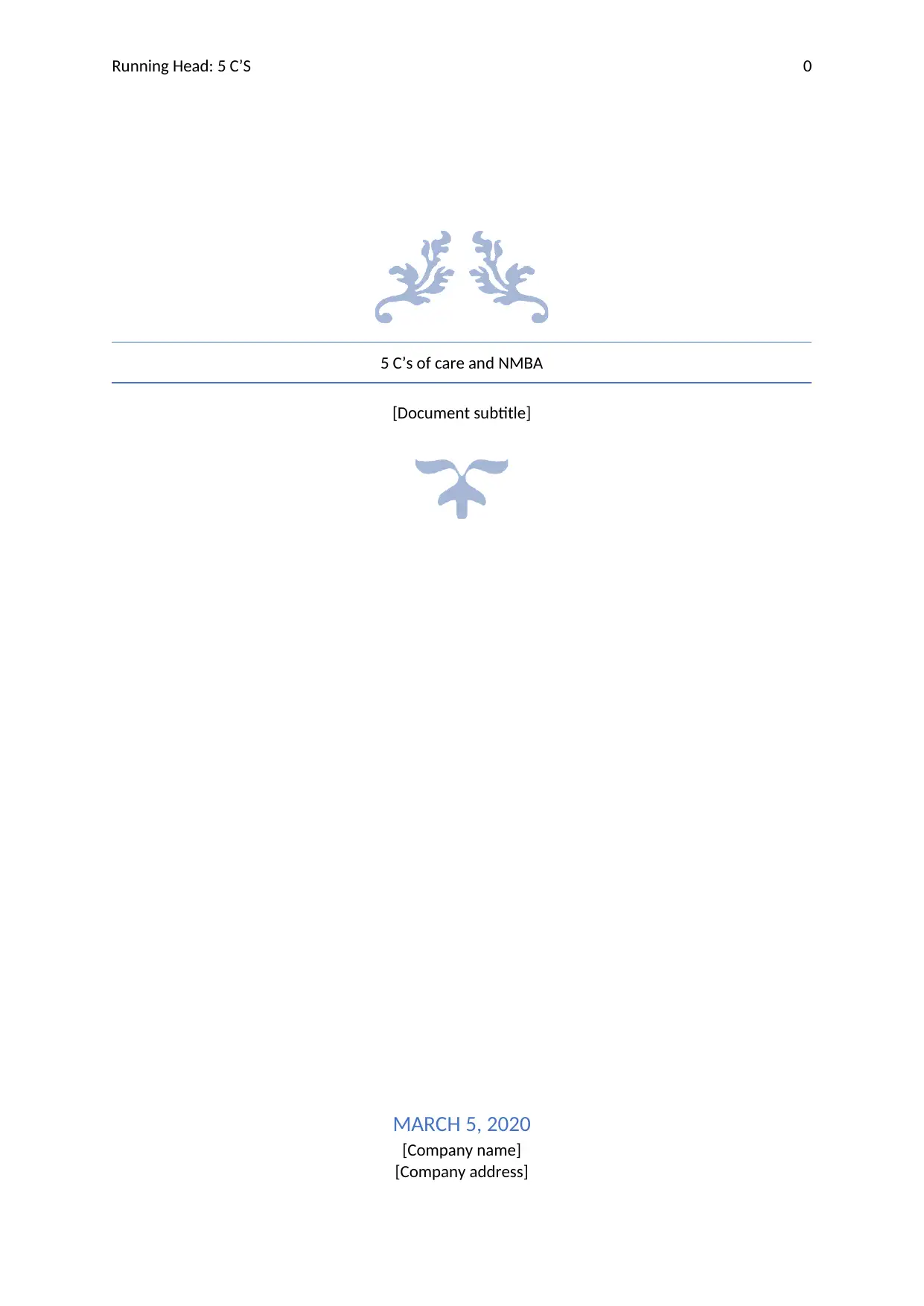
Running Head: 5 C’S 0
5 C’s of care and NMBA
[Document subtitle]
MARCH 5, 2020
[Company name]
[Company address]
5 C’s of care and NMBA
[Document subtitle]
MARCH 5, 2020
[Company name]
[Company address]
Paraphrase This Document
Need a fresh take? Get an instant paraphrase of this document with our AI Paraphraser
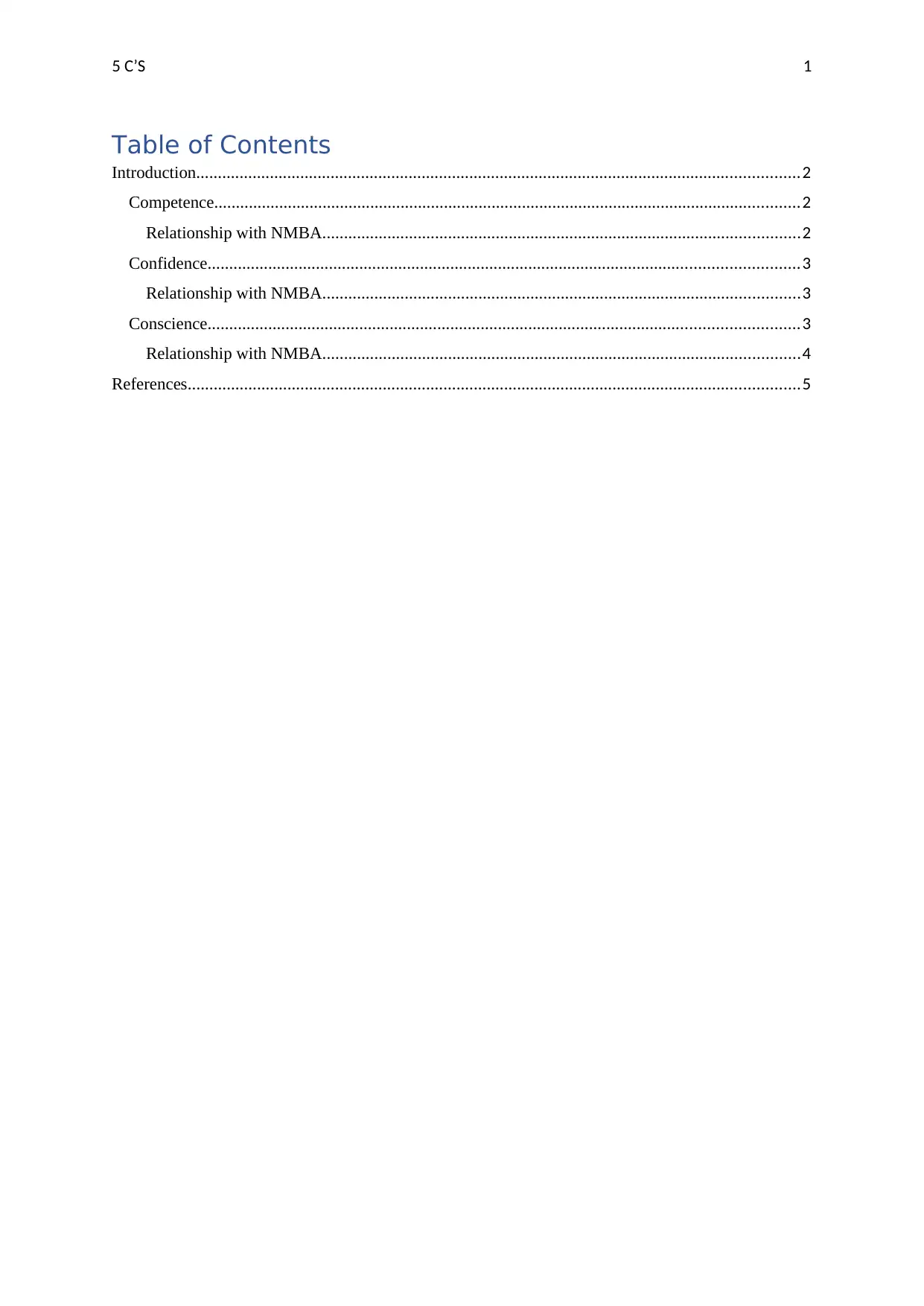
5 C’S 1
Table of Contents
Introduction...........................................................................................................................................2
Competence.......................................................................................................................................2
Relationship with NMBA..............................................................................................................2
Confidence........................................................................................................................................3
Relationship with NMBA..............................................................................................................3
Conscience........................................................................................................................................3
Relationship with NMBA..............................................................................................................4
References.............................................................................................................................................5
Table of Contents
Introduction...........................................................................................................................................2
Competence.......................................................................................................................................2
Relationship with NMBA..............................................................................................................2
Confidence........................................................................................................................................3
Relationship with NMBA..............................................................................................................3
Conscience........................................................................................................................................3
Relationship with NMBA..............................................................................................................4
References.............................................................................................................................................5
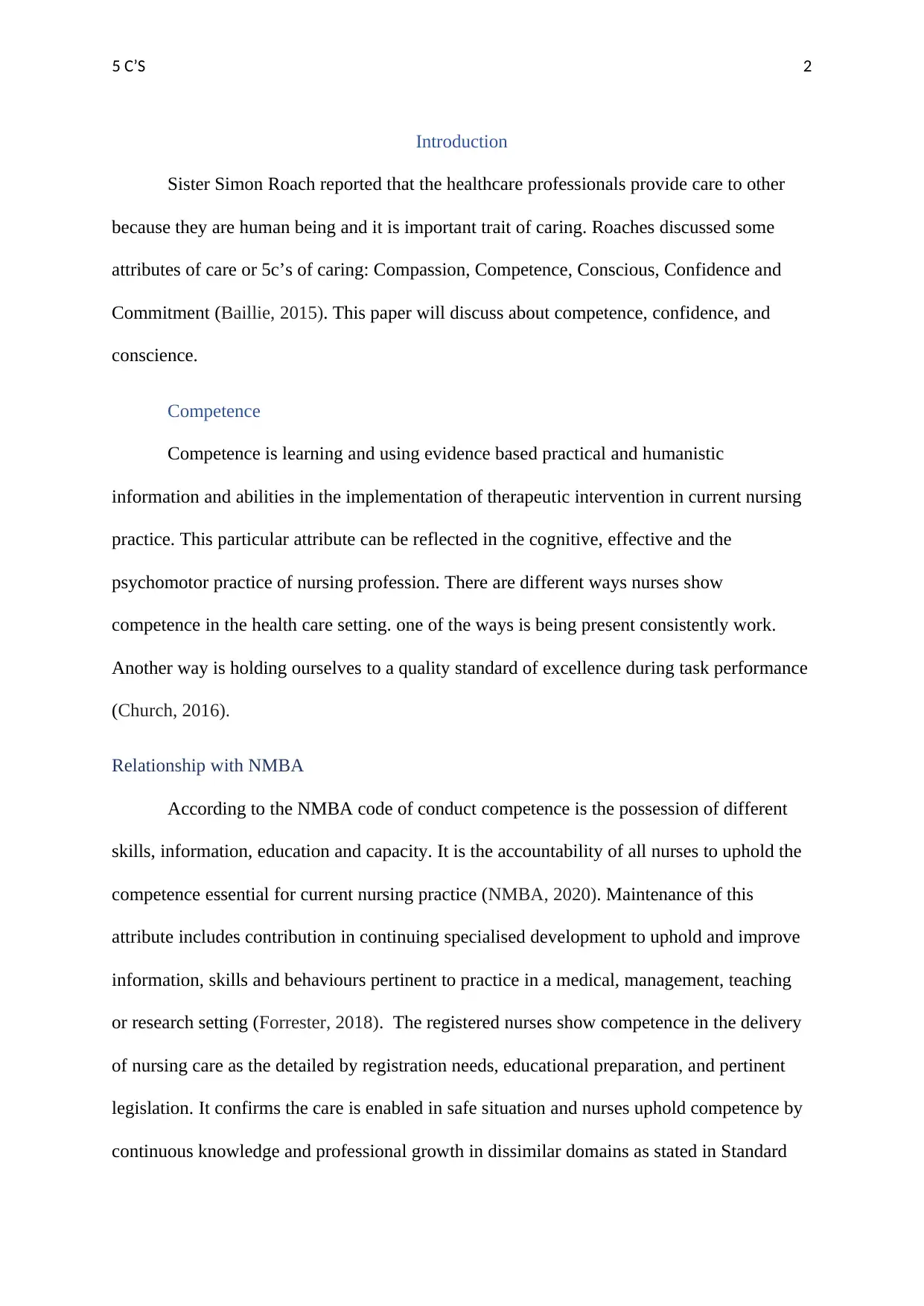
5 C’S 2
Introduction
Sister Simon Roach reported that the healthcare professionals provide care to other
because they are human being and it is important trait of caring. Roaches discussed some
attributes of care or 5c’s of caring: Compassion, Competence, Conscious, Confidence and
Commitment (Baillie, 2015). This paper will discuss about competence, confidence, and
conscience.
Competence
Competence is learning and using evidence based practical and humanistic
information and abilities in the implementation of therapeutic intervention in current nursing
practice. This particular attribute can be reflected in the cognitive, effective and the
psychomotor practice of nursing profession. There are different ways nurses show
competence in the health care setting. one of the ways is being present consistently work.
Another way is holding ourselves to a quality standard of excellence during task performance
(Church, 2016).
Relationship with NMBA
According to the NMBA code of conduct competence is the possession of different
skills, information, education and capacity. It is the accountability of all nurses to uphold the
competence essential for current nursing practice (NMBA, 2020). Maintenance of this
attribute includes contribution in continuing specialised development to uphold and improve
information, skills and behaviours pertinent to practice in a medical, management, teaching
or research setting (Forrester, 2018). The registered nurses show competence in the delivery
of nursing care as the detailed by registration needs, educational preparation, and pertinent
legislation. It confirms the care is enabled in safe situation and nurses uphold competence by
continuous knowledge and professional growth in dissimilar domains as stated in Standard
Introduction
Sister Simon Roach reported that the healthcare professionals provide care to other
because they are human being and it is important trait of caring. Roaches discussed some
attributes of care or 5c’s of caring: Compassion, Competence, Conscious, Confidence and
Commitment (Baillie, 2015). This paper will discuss about competence, confidence, and
conscience.
Competence
Competence is learning and using evidence based practical and humanistic
information and abilities in the implementation of therapeutic intervention in current nursing
practice. This particular attribute can be reflected in the cognitive, effective and the
psychomotor practice of nursing profession. There are different ways nurses show
competence in the health care setting. one of the ways is being present consistently work.
Another way is holding ourselves to a quality standard of excellence during task performance
(Church, 2016).
Relationship with NMBA
According to the NMBA code of conduct competence is the possession of different
skills, information, education and capacity. It is the accountability of all nurses to uphold the
competence essential for current nursing practice (NMBA, 2020). Maintenance of this
attribute includes contribution in continuing specialised development to uphold and improve
information, skills and behaviours pertinent to practice in a medical, management, teaching
or research setting (Forrester, 2018). The registered nurses show competence in the delivery
of nursing care as the detailed by registration needs, educational preparation, and pertinent
legislation. It confirms the care is enabled in safe situation and nurses uphold competence by
continuous knowledge and professional growth in dissimilar domains as stated in Standard
⊘ This is a preview!⊘
Do you want full access?
Subscribe today to unlock all pages.

Trusted by 1+ million students worldwide
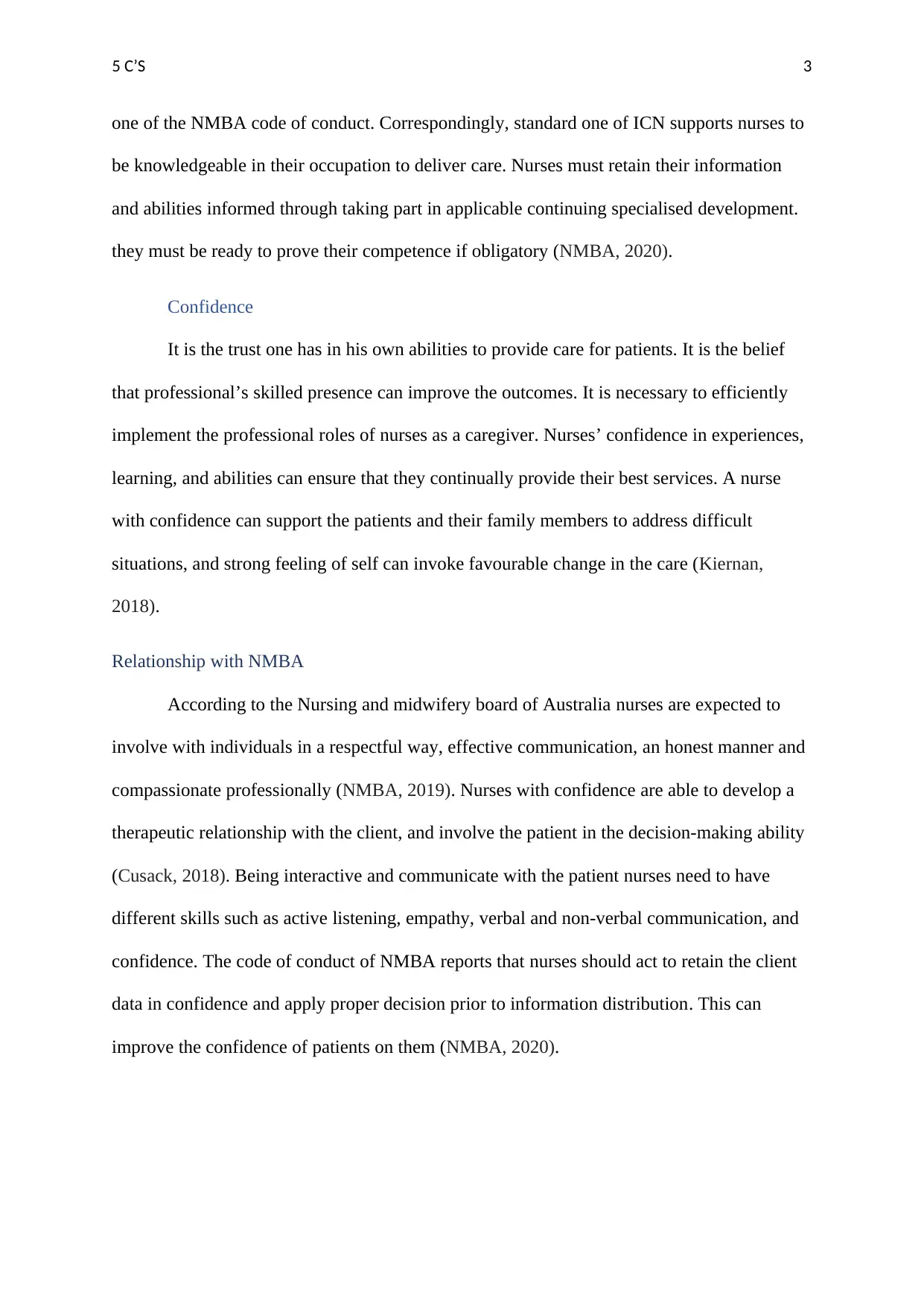
5 C’S 3
one of the NMBA code of conduct. Correspondingly, standard one of ICN supports nurses to
be knowledgeable in their occupation to deliver care. Nurses must retain their information
and abilities informed through taking part in applicable continuing specialised development.
they must be ready to prove their competence if obligatory (NMBA, 2020).
Confidence
It is the trust one has in his own abilities to provide care for patients. It is the belief
that professional’s skilled presence can improve the outcomes. It is necessary to efficiently
implement the professional roles of nurses as a caregiver. Nurses’ confidence in experiences,
learning, and abilities can ensure that they continually provide their best services. A nurse
with confidence can support the patients and their family members to address difficult
situations, and strong feeling of self can invoke favourable change in the care (Kiernan,
2018).
Relationship with NMBA
According to the Nursing and midwifery board of Australia nurses are expected to
involve with individuals in a respectful way, effective communication, an honest manner and
compassionate professionally (NMBA, 2019). Nurses with confidence are able to develop a
therapeutic relationship with the client, and involve the patient in the decision-making ability
(Cusack, 2018). Being interactive and communicate with the patient nurses need to have
different skills such as active listening, empathy, verbal and non-verbal communication, and
confidence. The code of conduct of NMBA reports that nurses should act to retain the client
data in confidence and apply proper decision prior to information distribution. This can
improve the confidence of patients on them (NMBA, 2020).
one of the NMBA code of conduct. Correspondingly, standard one of ICN supports nurses to
be knowledgeable in their occupation to deliver care. Nurses must retain their information
and abilities informed through taking part in applicable continuing specialised development.
they must be ready to prove their competence if obligatory (NMBA, 2020).
Confidence
It is the trust one has in his own abilities to provide care for patients. It is the belief
that professional’s skilled presence can improve the outcomes. It is necessary to efficiently
implement the professional roles of nurses as a caregiver. Nurses’ confidence in experiences,
learning, and abilities can ensure that they continually provide their best services. A nurse
with confidence can support the patients and their family members to address difficult
situations, and strong feeling of self can invoke favourable change in the care (Kiernan,
2018).
Relationship with NMBA
According to the Nursing and midwifery board of Australia nurses are expected to
involve with individuals in a respectful way, effective communication, an honest manner and
compassionate professionally (NMBA, 2019). Nurses with confidence are able to develop a
therapeutic relationship with the client, and involve the patient in the decision-making ability
(Cusack, 2018). Being interactive and communicate with the patient nurses need to have
different skills such as active listening, empathy, verbal and non-verbal communication, and
confidence. The code of conduct of NMBA reports that nurses should act to retain the client
data in confidence and apply proper decision prior to information distribution. This can
improve the confidence of patients on them (NMBA, 2020).
Paraphrase This Document
Need a fresh take? Get an instant paraphrase of this document with our AI Paraphraser
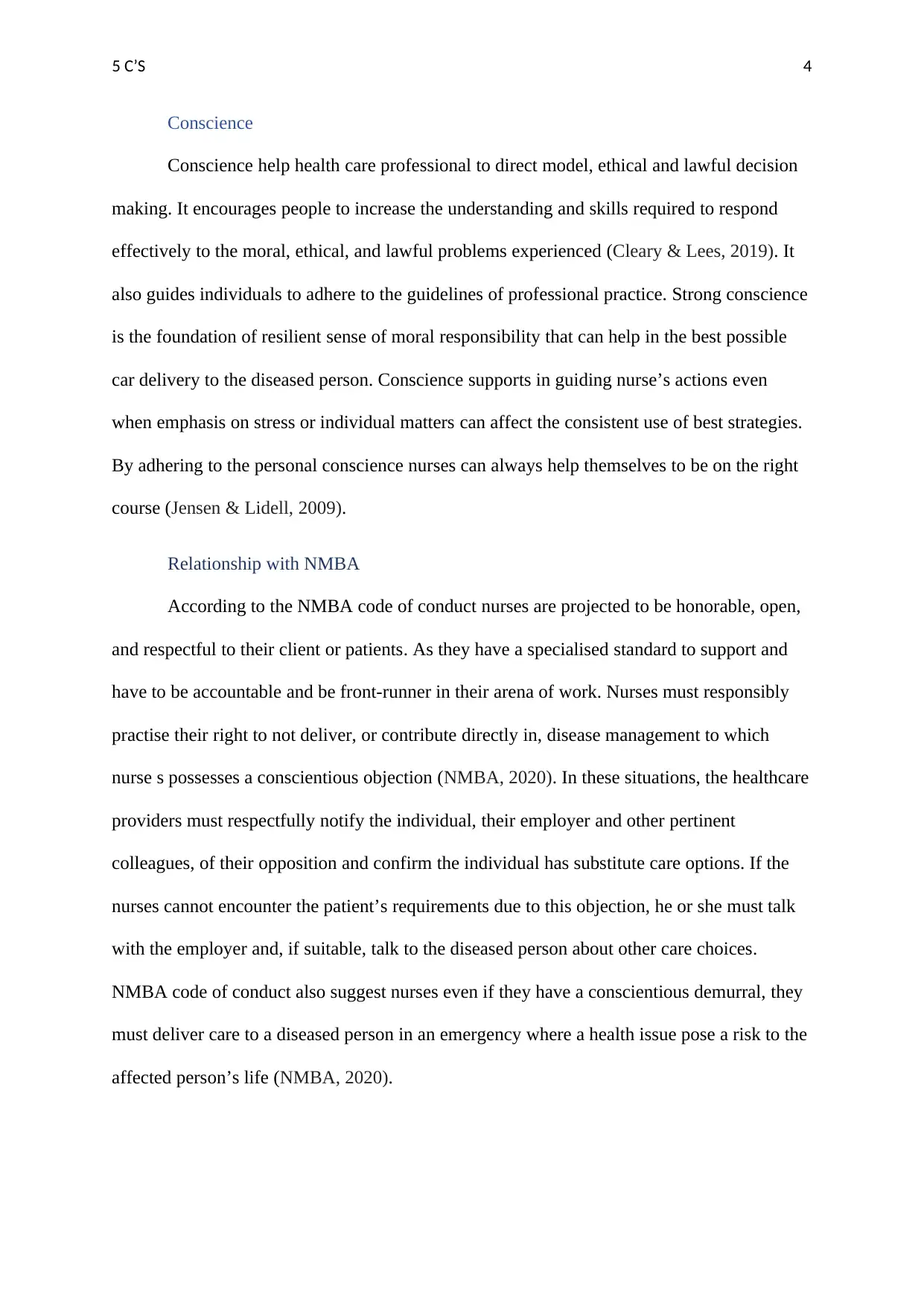
5 C’S 4
Conscience
Conscience help health care professional to direct model, ethical and lawful decision
making. It encourages people to increase the understanding and skills required to respond
effectively to the moral, ethical, and lawful problems experienced (Cleary & Lees, 2019). It
also guides individuals to adhere to the guidelines of professional practice. Strong conscience
is the foundation of resilient sense of moral responsibility that can help in the best possible
car delivery to the diseased person. Conscience supports in guiding nurse’s actions even
when emphasis on stress or individual matters can affect the consistent use of best strategies.
By adhering to the personal conscience nurses can always help themselves to be on the right
course (Jensen & Lidell, 2009).
Relationship with NMBA
According to the NMBA code of conduct nurses are projected to be honorable, open,
and respectful to their client or patients. As they have a specialised standard to support and
have to be accountable and be front-runner in their arena of work. Nurses must responsibly
practise their right to not deliver, or contribute directly in, disease management to which
nurse s possesses a conscientious objection (NMBA, 2020). In these situations, the healthcare
providers must respectfully notify the individual, their employer and other pertinent
colleagues, of their opposition and confirm the individual has substitute care options. If the
nurses cannot encounter the patient’s requirements due to this objection, he or she must talk
with the employer and, if suitable, talk to the diseased person about other care choices.
NMBA code of conduct also suggest nurses even if they have a conscientious demurral, they
must deliver care to a diseased person in an emergency where a health issue pose a risk to the
affected person’s life (NMBA, 2020).
Conscience
Conscience help health care professional to direct model, ethical and lawful decision
making. It encourages people to increase the understanding and skills required to respond
effectively to the moral, ethical, and lawful problems experienced (Cleary & Lees, 2019). It
also guides individuals to adhere to the guidelines of professional practice. Strong conscience
is the foundation of resilient sense of moral responsibility that can help in the best possible
car delivery to the diseased person. Conscience supports in guiding nurse’s actions even
when emphasis on stress or individual matters can affect the consistent use of best strategies.
By adhering to the personal conscience nurses can always help themselves to be on the right
course (Jensen & Lidell, 2009).
Relationship with NMBA
According to the NMBA code of conduct nurses are projected to be honorable, open,
and respectful to their client or patients. As they have a specialised standard to support and
have to be accountable and be front-runner in their arena of work. Nurses must responsibly
practise their right to not deliver, or contribute directly in, disease management to which
nurse s possesses a conscientious objection (NMBA, 2020). In these situations, the healthcare
providers must respectfully notify the individual, their employer and other pertinent
colleagues, of their opposition and confirm the individual has substitute care options. If the
nurses cannot encounter the patient’s requirements due to this objection, he or she must talk
with the employer and, if suitable, talk to the diseased person about other care choices.
NMBA code of conduct also suggest nurses even if they have a conscientious demurral, they
must deliver care to a diseased person in an emergency where a health issue pose a risk to the
affected person’s life (NMBA, 2020).

5 C’S 5
⊘ This is a preview!⊘
Do you want full access?
Subscribe today to unlock all pages.

Trusted by 1+ million students worldwide
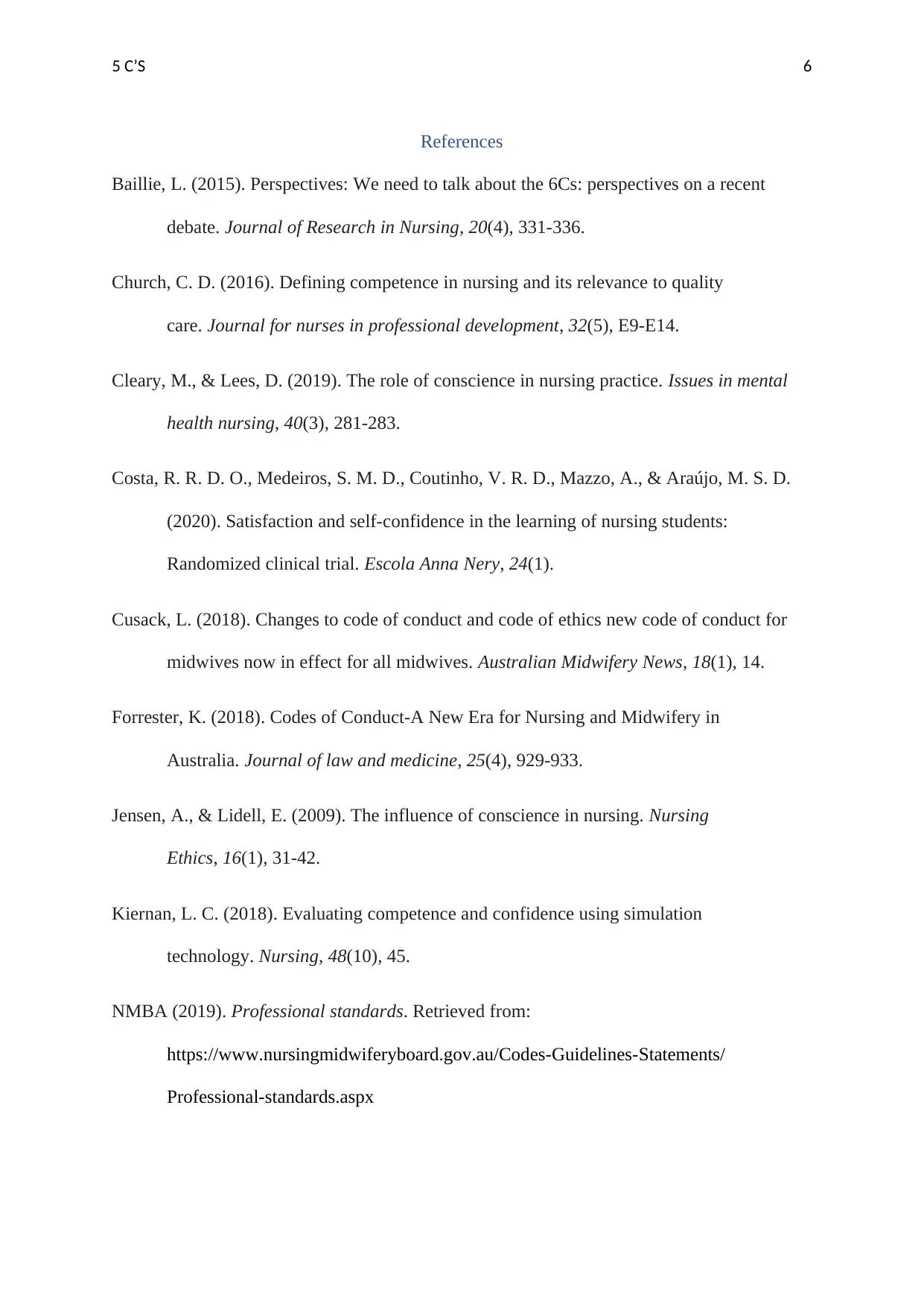
5 C’S 6
References
Baillie, L. (2015). Perspectives: We need to talk about the 6Cs: perspectives on a recent
debate. Journal of Research in Nursing, 20(4), 331-336.
Church, C. D. (2016). Defining competence in nursing and its relevance to quality
care. Journal for nurses in professional development, 32(5), E9-E14.
Cleary, M., & Lees, D. (2019). The role of conscience in nursing practice. Issues in mental
health nursing, 40(3), 281-283.
Costa, R. R. D. O., Medeiros, S. M. D., Coutinho, V. R. D., Mazzo, A., & Araújo, M. S. D.
(2020). Satisfaction and self-confidence in the learning of nursing students:
Randomized clinical trial. Escola Anna Nery, 24(1).
Cusack, L. (2018). Changes to code of conduct and code of ethics new code of conduct for
midwives now in effect for all midwives. Australian Midwifery News, 18(1), 14.
Forrester, K. (2018). Codes of Conduct-A New Era for Nursing and Midwifery in
Australia. Journal of law and medicine, 25(4), 929-933.
Jensen, A., & Lidell, E. (2009). The influence of conscience in nursing. Nursing
Ethics, 16(1), 31-42.
Kiernan, L. C. (2018). Evaluating competence and confidence using simulation
technology. Nursing, 48(10), 45.
NMBA (2019). Professional standards. Retrieved from:
https://www.nursingmidwiferyboard.gov.au/Codes-Guidelines-Statements/
Professional-standards.aspx
References
Baillie, L. (2015). Perspectives: We need to talk about the 6Cs: perspectives on a recent
debate. Journal of Research in Nursing, 20(4), 331-336.
Church, C. D. (2016). Defining competence in nursing and its relevance to quality
care. Journal for nurses in professional development, 32(5), E9-E14.
Cleary, M., & Lees, D. (2019). The role of conscience in nursing practice. Issues in mental
health nursing, 40(3), 281-283.
Costa, R. R. D. O., Medeiros, S. M. D., Coutinho, V. R. D., Mazzo, A., & Araújo, M. S. D.
(2020). Satisfaction and self-confidence in the learning of nursing students:
Randomized clinical trial. Escola Anna Nery, 24(1).
Cusack, L. (2018). Changes to code of conduct and code of ethics new code of conduct for
midwives now in effect for all midwives. Australian Midwifery News, 18(1), 14.
Forrester, K. (2018). Codes of Conduct-A New Era for Nursing and Midwifery in
Australia. Journal of law and medicine, 25(4), 929-933.
Jensen, A., & Lidell, E. (2009). The influence of conscience in nursing. Nursing
Ethics, 16(1), 31-42.
Kiernan, L. C. (2018). Evaluating competence and confidence using simulation
technology. Nursing, 48(10), 45.
NMBA (2019). Professional standards. Retrieved from:
https://www.nursingmidwiferyboard.gov.au/Codes-Guidelines-Statements/
Professional-standards.aspx
1 out of 7
Related Documents
Your All-in-One AI-Powered Toolkit for Academic Success.
+13062052269
info@desklib.com
Available 24*7 on WhatsApp / Email
![[object Object]](/_next/static/media/star-bottom.7253800d.svg)
Unlock your academic potential
© 2024 | Zucol Services PVT LTD | All rights reserved.





